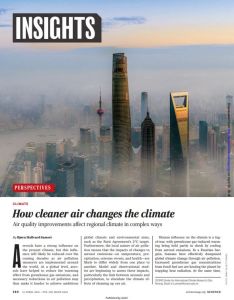Join getAbstract to access the summary!

Join getAbstract to access the summary!
Bjørn Hallvard Samset
How Cleaner Air Changes the Climate
Air quality improvements affect regional climate in complex ways
Science, 2018
What's inside?
Scrubbing the atmosphere of aerosol pollutants could worsen the effects of global warming.
Recommendation
Ambitious legislation to clean Earth’s atmosphere of aerosol pollution may be paradoxically at odds with humanity’s efforts to control global warming. Since most aerosol particles reflect sunlight, they can actually have a cooling effect on Earth’s land masses. Policy makers and environmentalists will appreciate this detailed article by climatologist Bjørn Hallvard Samset, which clarifies the complex atmospheric interactions of aerosols and greenhouse gases, combined with natural climate trends.
Summary
About the Author
Bjørn Hallvard Samset is Research Director at the CICERO Center for International Climate Research, Oslo, Norway.
















Comment on this summary